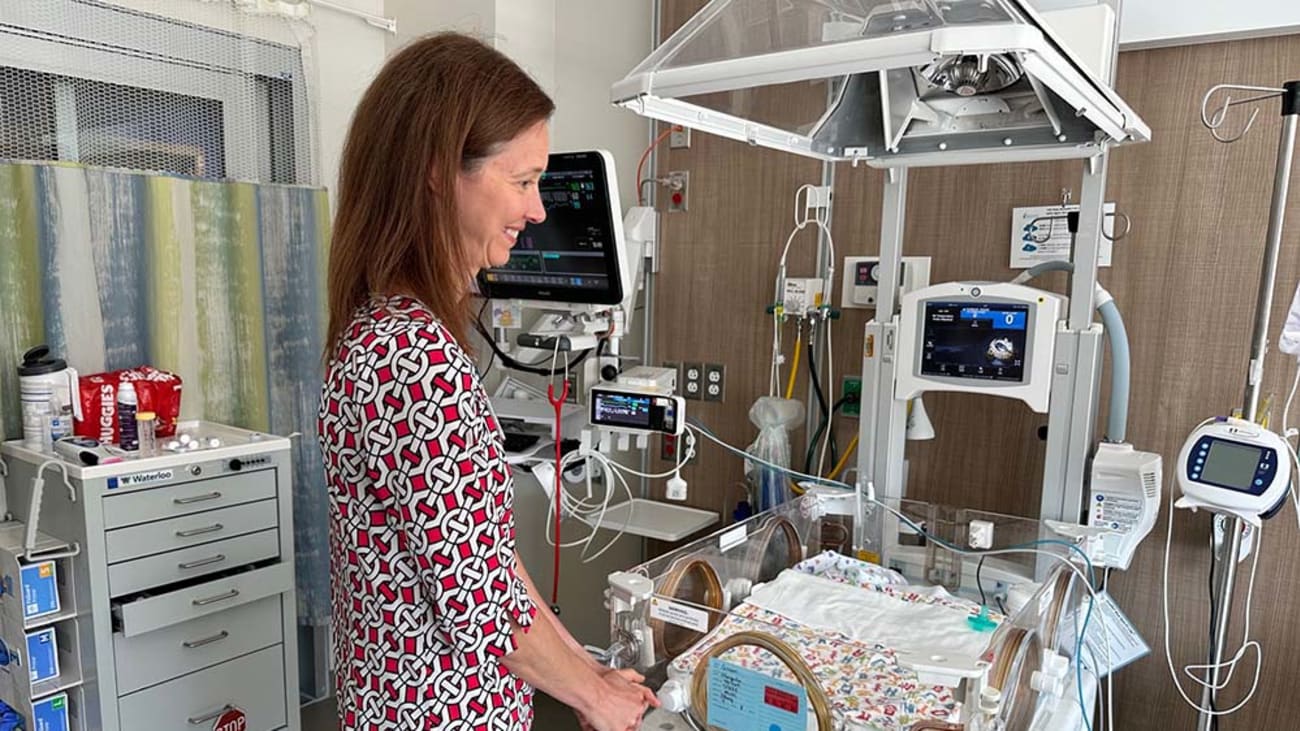
Pediatrician Julie Ross, M.D., is no stranger to seeing babies born with a condition called neonatal opioid withdrawal syndrome. Their mothers used opioids during pregnancy, and the babies are at risk of developing withdrawal symptoms after birth. “I would say we average probably once a week, maybe a little bit more,” she said of the frequency.
Ross sees those babies at the MUSC Shawn Jenkins Children’s Hospital. They’re easy for an expert like her to spot. “Some of the signs of opioid withdrawal can be a high-pitched cry, poor feeding, very difficult to console and to comfort and some increased muscle tone,” Ross said. Increased muscle tone means they may be stiff and uncomfortable.
So she’s pleased to be part of a large national clinical trial that found an approach called Eat, Sleep, Console is able to get these babies healthy and home more quickly than an older one called the Finnegan Neonatal Abstinence Scoring Tool.
“The Finnegan scoring system is a subjective long list of symptoms that babies may develop when they're withdrawing. We used that to determine which baby needs to be treated versus not, in terms of starting opioids that then, we have to wean off slowly,” Ross said.
“Eat, Sleep, Console takes some of the subjectivity out of it. It’s not just asking what the symptoms are but how severe they are. Are they affecting a baby’s ability to eat, sleep and be consoled?”
Babies in the study at 26 hospitals were ready to go home about a week earlier and were 63% less likely to get medication than babies who were treated using the older scoring system. “The initial clinical outcomes are very strong and consistent with what's been published in smaller-level studies over the course of many years,” Ross said.
“The purpose of this study was, ‘Can we generalize this to a very wide-breadth population of patients and multiple different types of centers – rural, urban – looking across the board? How does this look when you look at it in kind of this standardized research-focused mindset?’”
It looks good, she said – so far. Researchers will follow up after the babies turn 2 to see how they’re developing. “You want to make sure that the long-term outcomes are also supportive of using this care tool.”
The care tool was already promising enough that the National Institutes of Health funded the study. The results, published in the New England Journal of Medicine, come at a time when the number of babies born with opioid withdrawal is on the rise.
“Every 24 minutes a baby is diagnosed with neonatal opioid withdrawal syndrome in the U.S. Most hospitals are seeing the impact of opioid exposure in newborns and having a standardized approach in their care is really important,” Ross said.
She said pregnant women are on opioids for a variety of reasons. “Some are in medication-assisted treatment programs and have been on controlled doses of medications for a long period of time. And then there are moms that have used illicit drugs and that has crossed over the placenta.”
Whatever the reason, the Eat, Sleep, Console approach helps new mothers and their loved ones to ease the babies through what can be a difficult time. “It really empowers the family, and focus on the first-line treatment in the management of these babies is comfort,” Ross said.
“A lot of non-pharmacologic interventions can work. Family and caregivers being present at the bedside, holding, rocking their infant in a lower-stimulation environment, help support a baby so they can continue to feed well, and sleep and console.”
The treatment can include swaddling, skin-to-skin contact and breastfeeding. Ross said some babies will still need medication – just not as many as in the past.
Ross, an associate professor of pediatrics in the College of Medicine at the Medical University of South Carolina, said Eat, Sleep, Console not only appears to be better for babies, it’s also better for families.
“Our babies thrive at home. We never want a baby to have to remain in the hospital longer than they need to. We're here when a baby needs us. But the sooner that we can reunite them with their families the better. So we do love it when babies are able to go home safely earlier.”
